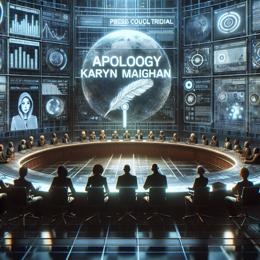Image created by AI
Press Council Appeals Panel Rules Against Mail & Guardian in Misreporting Case
In a noteworthy development surrounding ethical journalism, the Appeals Panel of the Press Council has reversed a previous decision by the Press Ombud, staunchly criticizing the Mail & Guardian for its reporting on Councillor Juwairiya Kaldine's involvement with a land transfer intended for a taxi rank development in Eldorado Park, Johannesburg.
The crux of the uproar was a 2022 article that implicated Kaldine, a representative of the Patriotic Alliance, in fraudulent activities by allegedly granting land owned by the Gauteng government to a taxi association without legal authority. This serious accusation prompted Kaldine and her party to lodge a complaint against the newspaper citing violations of the Press Code, particularly clauses that mandate truthfulness, accuracy, fairness, and protection of dignity and reputation in reporting.
Last year's ruling by the Deputy Ombud dismissed these complaints, suggesting the publication had taken sufficient action to verify the claims made in the report. However, Kaldine sought leave to appeal this ruling, focusing specifically on the misrepresentation of her letter to the taxi association.
The heart of the appeal was whether Kaldine actually granted permission for the taxi association to occupy the land, as reported by the newspaper, or merely stated she had no objections to this use—a significant difference in terminology with potentially vast legal ramifications. The Appeals Panel clarified that Kaldine’s letter expressed no objection to the association's occupation of the land but certainly did not grant permission, thus ruling that the Mail & Guardian had breached several clauses of the Press Code by inaccurately reporting her actions.
This decision is particularly impactful as it underscores the importance of precise language and thorough fact-checking in journalism. The panel vehemently rejected the newspaper’s defense that stating "no objection" equates to an authorization, emphasizing the chaos such a misinterpretation could cause in property dealings.
Moreover, the subsequent unauthorized occupation of the land by the taxi association could not retroactively legitimize the newspaper’s claims, bearing out the panel’s firm stance on maintaining the integrity of reported words and their meanings.
This ruling not only highlights the ongoing challenges in maintaining high journalistic standards but also raises questions about reporting on public interest issues, particularly in cases involving political figures and property management. Even though the panel's decision favored Kaldine, concerns about her initial suggestion to use the land without clear authority also linger, pointing to broader issues of governance and responsibility.
The case serves as a crucial reminder to the press community about the repercussions of neglecting diligent reporting practices and the impact of such oversights on public perception and the lives of individuals involved.










